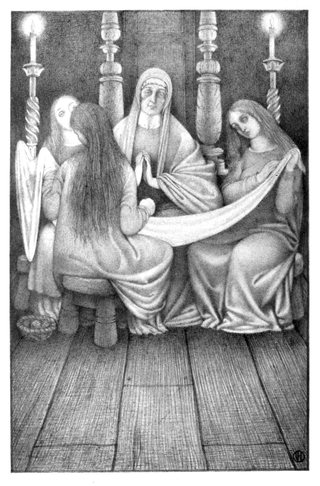Related Research Articles

The Child Ballads are 305 traditional ballads from England and Scotland, and their American variants, anthologized by Francis James Child during the second half of the 19th century. Their lyrics and Child's studies of them were published as The English and Scottish Popular Ballads. The tunes of most of the ballads were collected and published by Bertrand Harris Bronson in and around the 1960s.

"Lord Randall", or "Lord Randal", is an Anglo-Scottish border ballad consisting of dialogue between a young Lord and his mother. Similar ballads can be found across Europe in many languages, including Danish, German, Magyar, Irish, Swedish, and Wendish. Italian variants are usually titled "L'avvelenato" or "Il testamento dell'avvelenato", the earliest known version being a 1629 setting by Camillo il Bianchino, in Verona. Under the title "Croodlin Doo" Robert Chambers published a version in his "Scottish Ballads" (1829) page 324.
"The Daemon Lover" – also known as "James Harris", "A Warning for Married Women", "The Distressed Ship Carpenter", "James Herries", "The Carpenter’s Wife", "The Banks of Italy", or "The House-Carpenter" – is a popular ballad dating from the mid-seventeenth century, when the earliest known broadside version of the ballad was entered in the Stationers' Register on 21 February 1657.
"Mary Hamilton", or "The Fower Maries", is a common name for a well-known sixteenth-century ballad from Scotland based on an apparently fictional incident about a lady-in-waiting to a Queen of Scotland. It is Child Ballad 173 and Roud 79.
"Lady Isabel and the Elf Knight" is the English common name representative of a very large class of European ballads.
The Roud Folk Song Index is a database of around 250,000 references to nearly 25,000 songs collected from oral tradition in the English language from all over the world. It is compiled by Steve Roud. Roud's Index is a combination of the Broadside Index and a "field-recording index" compiled by Roud. It subsumes all the previous printed sources known to Francis James Child and includes recordings from 1900 to 1975. Until early 2006, the index was available by a CD subscription; now it can be found online on the Vaughan Williams Memorial Library website, maintained by the English Folk Dance and Song Society (EFDSS). A partial list is also available at List of folk songs by Roud number.
"The Cruel Mother" is a murder ballad originating in England that has since become popular throughout the wider English-speaking world.

"Lord Thomas and Fair Annet", also known as "Lord Thomas and Fair Eleanor", is an English folk ballad.
The Queen of Scotland is a folk song.
"Riddles Wisely Expounded" is a traditional English song, dating at least to 1450. It is Child Ballad 1 and Roud 161, and exists in several variants. The first known tune was attached to it in 1719. The title "Riddles Wisely Expounded" was given by Francis James Child and seems derived from the seventeenth century broadside version "A Noble Riddle Wisely Expounded".
Lord Maxwell’s Last Goodnight is an English-language folk ballad. It is based on the actions of John Maxwell, 9th Lord Maxwell, who killed Sir James Johnstone in 1608 as the culmination of a family feud. He fled to France and was sentenced to death in his absence, returning in secret five years later. He was apprehended and beheaded at Edinburgh on 21 May 1613.
"The Cruel Brother" is a folk song.
"Edward" is a traditional murder ballad existing in several variants, categorised by Francis James Child as Child Ballad number 13 and listed as number 200 in the Roud Folk Song Index. The ballad, which is at least 250 years old, has been documented and recorded numerous times across the English speaking world into the twentieth century.
"Babylon", also called "The Bonnie Banks o' Fordie" or "The Banks o' Airdrie" is an English-language folk song.
Mr. Motherwell gives a version under the title of Babylon; or, the Bonny Banks o' Fordie; and Mr. Kinloch gives another under the title of The Duke of Perth's Three Daughters. Previous editors have attempted to find a local habitation for this tradition, and have associated it with the family of Drummond, of Perth. As a legend exactly similar is current in Denmark, this appears a bootless quest.
Clerk Saunders is an English-language folk song, likely originating somewhere in England or Scotland. It exists in several variants.

"The Twa Brothers" is a traditional ballad existing in many variants.
The Young Earl of Essex’s Victory Over the Emperor of Germany, also known as Queen Elizabeth's Champion or Great Britain's Glory, is an English-language traditional folk song. With variations, the main story tells of an earl who goes to sea and confronts the German ships. The earl defeats the German emperor's son.
"Proud Lady Margaret" is an English-language folk song.
"Blancheflour and Jollyflorice" is a traditional ballad from Great Britain; it is included in a collection published as The English and Scottish Popular Ballads between 1882 and 1898 by Francis James Child. "Blancheflour and Jollyflorice" is included in the collection as Child ballad 300. Its Roud number is 3904.
References
- ↑ "Welcome to the Vaughan Williams Memorial Library". www.vwml.org.
- ↑ "Proud Maisrie / The Gardener / The Gardener Child (Roud 339; Child 219; G/D 4:840)". mainlynorfolk.info.
- ↑ Sedley, Stephen; Carthy, Martin (September 16, 2021). Who Killed Cock Robin?: British Folk Songs of Crime and Punishment. Reaktion Books. ISBN 9781789145021 – via Google Books.